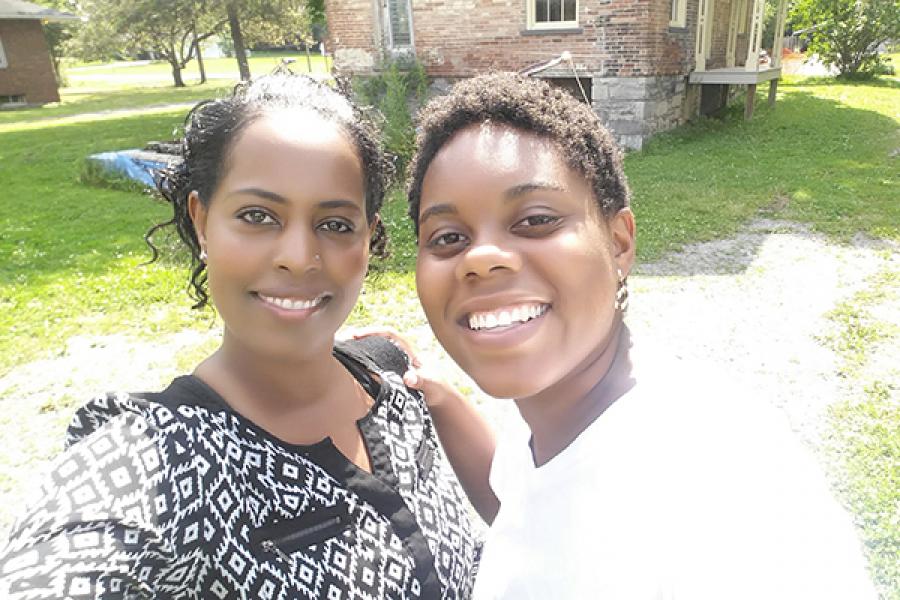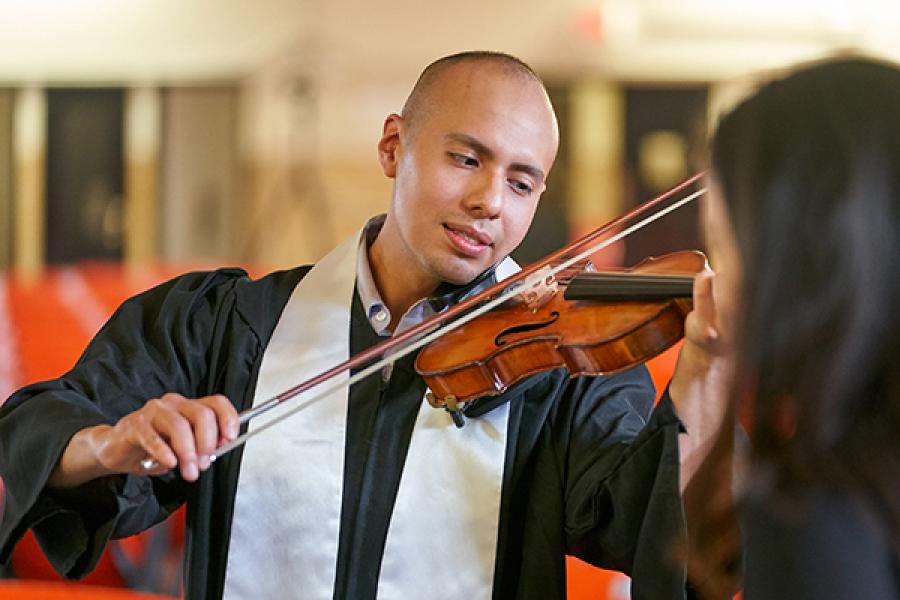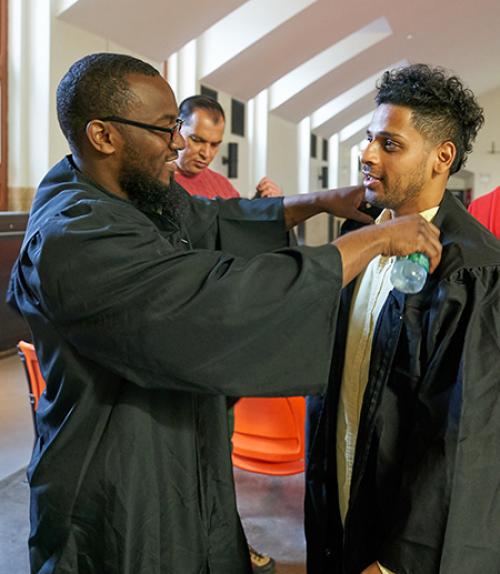Photo right: Kevin Davis, left, and Souvik Basu, two students in the Arabic class at Auburn Correctional Facility, get ready for the Cornell Prison Education Program commencement last spring, where they received associate's degrees from Cayuga Community College.
Renelle Mensah ’21 is unsure what this summer might bring, with the uncertainty of COVID-19 hanging over the U.S., but she’s hopeful that she’ll be back on campus again helping to teach Arabic language to residents of the Auburn Correctional Facility in Auburn, N.Y. through the Cornell Prison Education Program.
Mensah, a government major who is minoring in Arabic, was a teaching assistant last summer for Makda Weatherspoon, senior lecturer of Arabic in the Department of Near Eastern Studies, who led the two-month class for the first time.
Weatherspoon taught the second segment of the beginning class last fall and another A&S student, Simone Smith ‘20, helped Weatherspoon lead an Arabic workshop this spring until teaching was interrupted because of the COVID-19 pandemic. Smith is a government major who is minoring in crime, prisons, education and justice. The Prison Education Program is provisionally planning on a summer session, though it will largely be dedicated to completing the spring courses.
“Renelle helped demonstrate mini dialogues with me and worked with students in small groups,” Weatherspoon said. “Moreover, the fact that she is a non-native speaker studying Arabic just like the students was inspiring to them and proved that Arabic can be learned by anyone.”
“Simone was especially thoughtful about her own positionality as a visitor to prison from an elite University, and clear in her belief that higher education should be accessible by all,” said Tess Wheelwright, academic director of the Prison Education Program.
Mensah started taking Arabic her freshman year and jumped at the chance when Weatherspoon offered to have her help with the summer class.
Makda Weatherspoon, left, and Renelle Mensah outside the Harriet Tubman House in Auburn.“I was really excited to apply what I had learned because everything I had done so far was in the classroom,” Mensah said. “I hadn’t traveled to an Arabic speaking country yet, so this was an opportunity to use my skills stateside.”
Mensah said the class helped her strengthen her own Arabic skills, as most of the residents at the correctional facility were brand new to the language.
Smith’s experience this semester came after she had just returned from a semester in Jordan, studying Arabic, so she was eager to keep up the language. “Working as an Arabic TA through CPEP allowed me to combine my interest in prison education/criminal justice reform with my interest in the Middle East and Arabic,” she said.
The class foused on reading, writing, listening and speaking Modern Standard Arabic along with spoken Arabic, Weatherspoon said. “Culture is intentionally embedded in the curriculum from the very beginning. We also introduce history and geography of the Arab world as we teach the language.”
The only difference between Auburn and Cornell classes was the number and frequency of contact hours per week, Weatherspoon said. “The same types of tests and assessments given to Cornell students were given to Auburn students,” she said, adding with a smile that Auburn students performed slightly better than their Cornell counterparts on exams.
Working with students in the class, Mensah was inspired by their drive.
“The energy I felt there was similar to what I feel in my most interesting classes here,” she said. “Despite whatever they’re going through, they’re upbeat and dedicated to the work that they’re doing.”
In between classes, students could listen to offline audio and video clips and complete exercises in the prison’s computer lab, Wheelwright said.
Julio Iglesias, one of the students in the Arabic class at Auburn Correctional Facility, plays the violin during last spring's commencement ceremony.Students were enthusiastic about Weatherspoon, saying she turns learning the language into a game, Wheelwright said. “The evening I got to visit last summer, there was a lot of laughter as students took turns performing dialogues. They had given each other Arabic nicknames and had clearly bonded as a group in this endeavor,” she said.
The group bonding was also something Weatherspoon watched with interest. “At first, they sat only with specific people and there seemed to be a sense of 'separation' among them. After about three meetings, the students worked together and helped each other out; where they sat or who they worked with was no longer an issue.”
Both Mensah and Smith said the teaching experience is helping them refine what they want to do in their careers.
Mensah would like to work abroad and said she thinks the combination of government and Arabic will open many doors for her.
“I’m considering either domestic policy or foreign policy,” she said. “I want to serve the U.S. government in some way, to improve the impact of policies.”
Smith plans to go to law school and eventually work on criminal justice reform policy. “I also want to continue to advocate for college-in-prison programs and participate in programs where I can,” she said.






